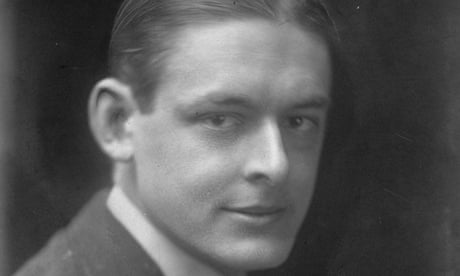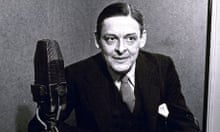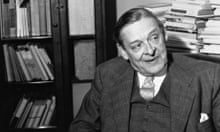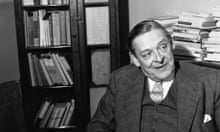Among the first fruits of TS Eliot's conversion were the first three parts of the poem that he ended up calling Ash Wednesday and that, accordingly, we think of, not wholly inaccurately, as an essentially liturgical piece. Ash Wednesday is – after all – a set of rituals and prayers that Anglicanism ended up transferring across from Catholicism essentially unaltered. For a high Anglican like Eliot it was perhaps especially important that Protestants such as Thomas Cranmer tried to remove them and failed. The liturgy is a reminder of mortality and a call to repentance both individual and collective; the poem does these things, but also creates, in its later sections, an idealised medieval landscape, a jewelled pictorial Book of Hours to contemplate as well as pray over.
Yet that is not all that is going on here. When the poem was first published as a whole in 1930, it was dedicated to Vivienne, from whom he was increasingly estranged but not yet formally separated. Eliot had chosen as his spiritual adviser a clergyman who, after hearing his confession, agreed that he should probably end the marriage – it's worth remembering that for Eliot, who never tried to divorce Vivienne, this meant, because he took these issues seriously, a choice of celibacy. This is perhaps not entirely surprising given how he had written of the sexual life in The Waste Land and in Sweeney Agonistes; his misogyny meant that he blamed and went on blaming Vivienne. (When he appeared as the murderer Crippen for fancy dress, she went as his cross-dressed mistress and accomplice, not his wife and victim.)
For a religious poem, Ash Wednesday has a distinctly secular aspect some of the time. Even more than The Waste Land, it is heavily intertextual; you can read its allusions as metonymous, that is to say as bringing into his text the whole of the texts that they echo. The first section, for example, originally had the title of a love poem by the Florentine Cavalcanti that its first line echoes: "Perch'i' no spero di tornar giammai" – "Because I do not hope to turn again".
We are so used to reading what Eliot wrote, with its evocation of spiritual dryness, its sense of himself as "an aged eagle" with stubs instead of wings – he was 40 – learning "to sit still" and find spiritual solace in withdrawal and renunciation, that it comes as a shock to realise that in the poem he chose to echo, the dying Cavalcanti is still praising his mistress, sending his poem to be her comforter. There is something quite creepy in his dedicating the whole poem to Vivienne when the first section so totally refuses to be the sort of love poem it echoes.
The second section is just as sinister, but also Eliot at his most beautiful and lyrical. The echoes here are of courtly love again, but also of Dante – the leopards that have eaten the poet's heart and brains leaving his bones dry are associated with sins like lust and idleness and gluttony – and the brothers Grimm. Unpack that reference and we find long-concealed murder and betrayal revealed and punished against all odds – what was there in Eliot's marriage to Vivienne that makes him feel such a sinner? That was so dreadful that his confessor thought he should end it? That makes the bones glad to be done with life – "we are glad to be scattered, we did little good to each other"?
Yet tied to these moments of nightmare – and the ones in the next section where Eliot is pursued on a staircase by sinister ghosts and urban squalor – is the evocation of a Lady, who is the Virgin, and all of the Beloveds of courtly love, and most especially Dante's Beatrice, and is also associated with gardens and fertility and a sort of organic community. She is also, presumably, Emily Hale, whom Eliot's poetry associates with gardens from the beginning; Eliot demonises one of his muses and places another on a goddess-like pedestal, and in both cases you end up feeling that the real woman gets progressively erased from his work.
It's interesting that there is so much talk of fertility here and it is always gardens and never children. By separating from Vivienne, and adopting celibacy, Eliot was accepting childlessness. In a more or less contemporaneous poem called Marina, he talks of yearning for a daughter – echoing Shakespeare's Pericles and his reunion with his child against the odds, but also, in the epigraph, Seneca's Hercules, waking from a madness in which he has killed wife and child. There is something deeply sad, but also dishonest, in this replacement of what he perhaps really desired with an etiolated and inauthentic religious vision; Eliot at his best speaks more honestly than that, even when he is being cryptic.
The later sections of the poem are a call to spiritual awareness, and acceptance of divine forgiveness. There's something worrying, if logical, about Eliot's vision of himself as a preacher calling the world to order – it was after all, the original family business, running revivals was why his ancestors moved to the Midwest. The problem is that the organic society he shows us is so totally a decoration, people walking and talking in a landscape, and a piper playing plaintive tunes; in the later sections of Ash Wednesday, the quotations of liturgy are progressively stronger than the bits that are Eliot.
This is a poem – the same can be said of Dante – in which the visions of hell are stronger than the visions of heaven, in which the original evocation of the heavenly (the lyric "Lady of silences" in the second section) is much more effective than the later parts; Eliot is trying urgently to convince us, and sacrificing much to that attempt, and yet he falls short of what he is trying to do.







